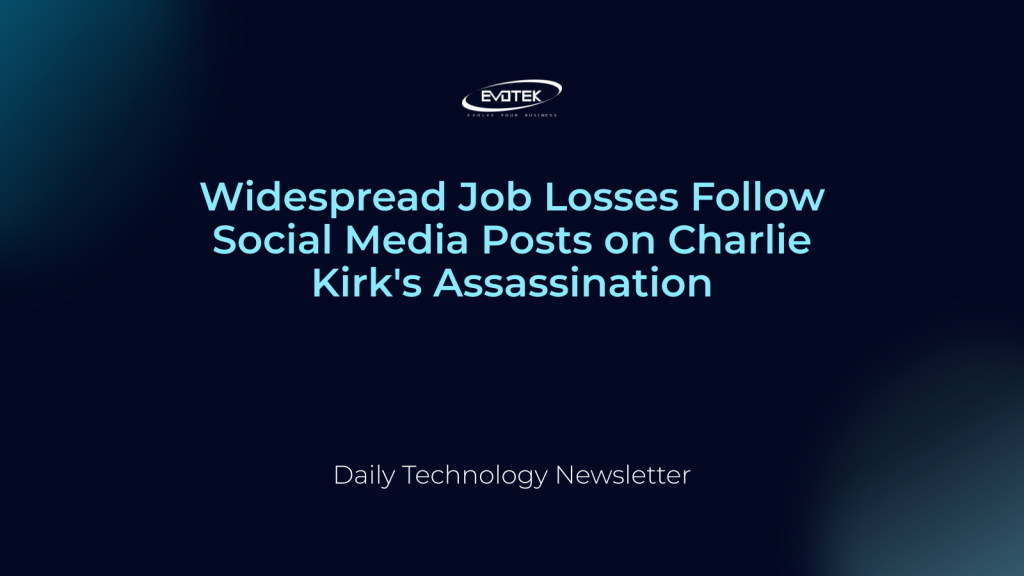September 13, 2025
An NPR analysis reveals that over thirty individuals nationwide have faced severe employment repercussions, including firings, suspensions, investigations, or calls for resignation, all stemming from their social media posts regarding conservative influencer Charlie Kirk’s recent assassination. These posts either criticized Kirk or expressed satisfaction over his death earlier this week in Utah.
The fallout continues to escalate as certain GOP lawmakers and officials signal their intent to penalize individuals for their online speech. Conservative activists are actively collecting and publicizing social media profiles and posts they deem to be “celebrating” Kirk’s death, demanding the termination of those responsible. Influencers like Joey Mannarino have openly encouraged tactics such as reverse image searching profile pictures, cross-referencing LinkedIn profiles, and contacting employers to ensure job loss for offending posters.
Prominent Republican figures, including Laura Loomer and Chaya Raichik of Libs of TikTok, have amplified this campaign by sharing screenshots of controversial posts and calling for immediate action against the users.
Educators and Professionals Among the Affected
NPR has documented 33 individuals who have either lost their jobs or are under investigation due to their social media activity as of Friday. The majority, at least 21, are public school teachers from various districts across the country, who have been fired, placed on administrative leave, or are currently under employer investigation. The purge extends beyond education, affecting firefighters, military personnel, a sports reporter, an employee of the Carolina Panthers, and an Indiana city council official, who have all faced similar sanctions or demands for their resignation.
Among the earliest and most high-profile cases was MSNBC analyst Matthew Dowd, a former Republican political consultant. As initial reports of a shooting at a Kirk event emerged, Dowd made live television comments that quickly drew conservative backlash. He speculated about the shooter’s motives, noting Kirk’s history of “pushing this sort of hate speech aimed at certain groups,” and connecting “hateful thoughts” to “hateful actions.” Dowd’s comments, made before Kirk’s death was confirmed, led to his firing later that day.
Dowd later clarified and apologized, stating he was unaware Kirk was the target when he spoke. He attributed his dismissal to a “Right Wing media mob” to which MSNBC reacted.
Free Speech Under Scrutiny
Charlie Kirk’s own rhetoric was often inflammatory, including questioning the intellect of women and Black people, defending gun deaths for Second Amendment rights, asserting the 1964 Civil Rights Act was a mistake, and portraying immigrants and transgender people as threats.
The intense social media scrutiny following Kirk’s death, according to David Kaye, a law professor specializing in international human rights and free speech, effectively “silences” those who wish to debate Kirk’s legacy. While Kaye emphasizes that political violence has no place in a democracy and celebrating such events is wrong, he also asserts, “I don’t think that in a democracy we can clamp down on people engaging in debate over the legacy of somebody who was killed.”
“Expose Charlie’s Murderers” Website Fuels Backlash
This campaign of online retribution appears particularly intense due to an anonymously launched website, “Expose Charlie’s Murderers.” The site aggregates social media posts, names, locations, and employment details of individuals accused of “celebrating Charlie’s death.” As of Friday morning, the site featured over 40 people and claimed to be expanding into a searchable database of 20,000 entries. WIRED has reported that some individuals featured on the site have received death threats.
U.S. Sen. Marsha Blackburn, R-Tenn., publicly demanded the firing of an assistant dean at Middle Tennessee State University for a Facebook post stating, “Looks like ol’ Charlie spoke his fate into existence. Hate begets hate. ZERO sympathy.” The assistant dean was subsequently fired.
Other examples include an Oklahoma teacher who wrote, “Charlie Kirk died the same way he lived: bringing out the worst in people,” now under investigation. A Texas teacher, targeted by Republican state Rep. Briscoe Cain, posted, “Could this have been the consequences of his actions catching up with him?” and “#karma is a b*tch.” In Naples, NY, a teacher faced an investigation for allegedly likening Kirk to a Nazi and posting, “Good riddance to bad garbage.” Florida’s Education Commissioner Anastasios Kamoutsas has vowed to investigate teachers making “despicable comments.”
A now-deleted Instagram comment, allegedly from a New Orleans firefighter, read, “I think he should be forced to carry that bullet in his body. That bullet has a right to be there because it’s a gift from god.” This post, shared by Libs of TikTok and subsequently by the state’s attorney general calling for “consequences,” has triggered an investigation by the New Orleans Fire Department.
Several individuals who lost their jobs due to these posts declined to comment, citing fears for their safety and the death threats they have received.
Republicans in Power Pledge Punishment
State and federal lawmakers and officials are leveraging their positions to punish those perceived to be celebrating Kirk’s death. Deputy Secretary of State Christopher Landau indicated his office might revoke U.S. visas for foreign nationals based on their social media remarks about the murder. Navy Secretary John Phelan warned that any uniformed or civilian Department of the Navy employee who “brings discredit upon the Department” would face swift action.
U.S. Rep. Clay Higgins, R-La., announced plans to “use Congressional authority and every influence with big tech platforms to mandate immediate ban for life of every post or commenter that belittled the assassination.” This stance marks a significant shift from past Republican opposition to content moderation. He further stated his intent to target business licenses, permitting, and even driver’s licenses of those involved.
Loretta Ross, a community activist and Smith College professor, views Kirk’s assassination as a tragedy now being used to suppress free speech. She drew parallels to the McCarthy era, cautioning against an “overreaction” that punishes individuals for their opinions, lamenting that “someone’s passing just becomes another way to further an agenda that further divides us.”

 日本語
日本語 한국어
한국어 Tiếng Việt
Tiếng Việt 简体中文
简体中文